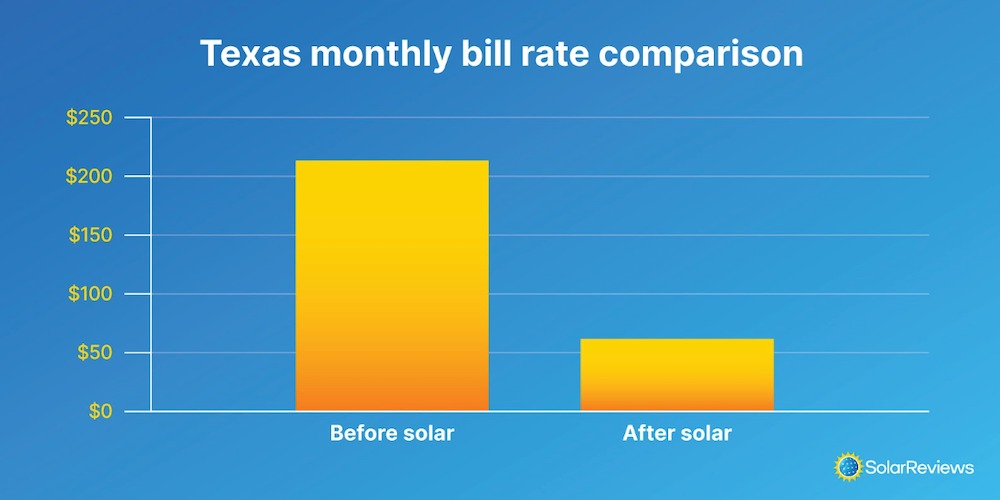Updated 1 year ago
What is the average electric bill in Texas in 2025?
Written by
Jamie Smith

Find out what solar panels cost in your area
They say everything’s bigger in Texas – does that include your monthly electric bill? We’re here to break down that number for you and give you an accurate estimate of your monthly bill to power your home or apartment when you live in the great state of Texas.
Many Texans saw huge increases in their electricity rates in 2022, reaching prices close to $0.20 per kilowatt-hour (kWh). Even though rates have fallen in 2024 to about $0.15 per kWh, chances are your electric bill is still higher than you want it to be.
Going solar can help offset those costs tremendously – and Texas is one of the best states in the country to do it! With local incentives, property tax exemption, and a 30% federal tax credit on your system, going solar is more affordable than ever in the Lone Star State.
What does the average electric bill look like in Texas?
The average monthly electric bill in Texas is about $166.
We know that how you live and the size of your home will determine how much you’re paying for electricity per month, so giving one overall number doesn’t cut it. The chart below shows a better understanding of what you can expect to spend on average for your monthly electric bill, depending on the size of your home or apartment.
Type of building | Est. monthly electricity consumption | Avg. monthly electric bill |
|---|---|---|
One-bedroom apartment | 400 kWh | $56 |
Two-bedroom apartment | 580 kWh | $85 |
Small house | 725 kWh | $107 |
State-wide average | 1,178 kWh | $166 |
Large house | 1,675 kWh | $245 |
This chart shows estimated electric bill values based on the average square footage of different types of homes. However, the size of your house isn’t the only thing that impacts your electric bill.
How do electric bills in Texas compare to the rest of the U.S.?
In 2025, the average monthly electric bill is about $144, at about $0.17 per kWh.
You should expect to pay a bit more when you live in Texas. This is because, on average, Texas has bigger houses and experiences hotter days than most states, so residents have to use more electricity to cool off in the Texas heat.
What factors can affect your electric bill in Texas?
As we said before, the size of your home isn’t the only thing that impacts your bill. Though we just gave you a rough estimate of what you can expect to pay, other factors can affect your electric bill drastically each month.
Retail electric provider
In Texas, electric utilities are deregulated, making it possible for many residents to choose which retail electric provider to use. Basically, you get to shop around for electric rates.
The retail electric provider you choose can drastically affect your electric bill. It’s good to do your research – find a reputable provider that offers a solid fixed-rate plan without any crazy fees or additional costs.
Extreme weather conditions
Texas heat is no joke. During the summer months, you might see your bill jump way higher than usual to power your air conditioning units or central air systems. Texas has also been having record-breaking winter storms over the past few years. This may have you heating your house more than you’re used to, hiking up your utility bills. Keep this in mind when you choose your electric provider as well.
Consumption
This one’s a no-brainer – the more kWh of electricity you use, the more you pay. However, the amount of electricity your household consumes depends on several aspects. For one thing, how many people you live with will impact how much you consume. Also, consider how many of your household appliances use electricity as well. Do you heat your house using electricity? Is your stove electric? These are all things to consider every month.
If you’re trying to lower your monthly bill, try to keep your electricity usage to a minimum. That means remembering to turn the lights off when you leave a room!
Natural gas
Texas is the country's biggest natural gas manufacturer, so it’s no wonder most of the state’s electricity is produced by it. In fact, Texas has over 47,000 miles of natural gas transmission pipelines.
To get natural gas turned into electricity, suppliers pump gas from the ground and then sell it to power plants to generate electricity to power your home. Since the market is constantly changing, fuel costs can fluctuate. The marketplace for this energy source can dictate your average energy bill in the Lone Star State.
How solar can help you save money in Texas
It’s evident that electric bills in Texas are getting pricey, but luckily, there are ways to help cut some of those costs. Depending on your electricity plan, you can eliminate most of your electricity bill when you install solar panels. Texas is one of the best states in the country to go solar, with some utilities offering excellent upfront rebates.
For example, customers of Oncor, the largest power utility company in Texas, can get a rebate of up to $9,000 when they install solar panels and an energy storage system to their home. If you’re a resident of the Austin area, Austin energy customers can earn a $2,500 rebate when they install solar panels. With the 30% federal tax credit, installing a solar system is more affordable than ever!
The chart below clearly shows how much you can save when you go solar.

Going solar is a great way to invest in renewable energy and will keep plenty of money in your pocket over your system’s lifetime.
Check out our solar calculator to explore how installing a solar system on your home can help you save money!
Jamie is a content writer and researcher with a B.S. in Communications from La Salle University, where she focused on journalism, mass media, and public relations. As a former member of the SolarReviews editorial team, she created content to help homeowners better understand solar energy and make informed decisions. Prior to joining SolarReviews, she worked at a marketing company producing long-form stories and interviews that highlighted small ...
Learn more about Jamie Smith